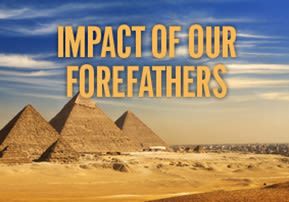
Vayigash: Impact of Our Forefathers
The fact that the strongest society on earth humbles itself before our forefathers lets us know what Messianic times will be like...

One of the mysteries of Jewish history is the slow but steady impact the Jewish people have had on world consciousness and ethics. When people were being thrown to the lions for sport, the Torah required us a level of sensitivity diametrically opposed to the hedonism of the times. And as much as we were shunned for our values, slowly much of the world has incorporated the teachings from Sinai. If we take an overview of the book of Genesis, from the first stories concerning Abraham until the reuniting of Jacob and Joseph, in this week's reading, we'll find this fascinating theme woven into fabric of the stories.
I'd like to give one in-depth example of the interplay between our forefathers and the nations they came in contact with and then give a general overview of subsequent stories, picking out some of the subtleties that might have been overlooked. Hopefully, we'll see the impact the nascent Jewish people had on the world around them.
Abraham's first recorded encounter with other nations was during a drought that devastated the land of Israel upon his arrival there. Facing famine, he decided to descend to Egypt along with his wife Sarah. Aware of Sarah's beauty and the Egyptian mentality, Abraham claimed that he was her brother and not her husband for fear of his life. (That was Egyptian rules of fair play: pay off the brother, kill the husband!) Abraham's concerns were accurate and she was taken to Pharaoh against her will. Although Pharaoh payed Abraham richly for the "rights" to "his sister", even so, Pharaoh was punished for his misdeed and quickly responded by sending  them out of Egypt. On a basic level, Pharaoh, angry at the damage inflicted upon him and his nation, wanted them out of his country as quickly as possible. But on a deeper level, he and his society weren't ready for a relationship with Abraham and all he stood for and therefore, had no choice but to send him away.
them out of Egypt. On a basic level, Pharaoh, angry at the damage inflicted upon him and his nation, wanted them out of his country as quickly as possible. But on a deeper level, he and his society weren't ready for a relationship with Abraham and all he stood for and therefore, had no choice but to send him away.
Later on, a similar event took place with Avimelech, the King of Gerar. The same necessary deception was played out by Abraham by calling Sarah his sister and Avimelech followed in Pharaoh's footsteps by abducting Sarah. He was severely rebuked by Hashem for having taken Sarah. However, after freeing her, he responded in a drastically different way. Instead of driving them from his land, he invited Abraham to dwell there. This change represented a growing recognition of Abraham's greatness and subsequent willingness to have him co-exist with the non-Jewish society.
The pinnacle of appreciation for Abraham was reached after Sarah passed away and Abraham purchased a burial plot for her. The acquisition of the grave is not our main focus. What is essential in that story is the incredible honor afforded to Abraham in the sale: "You are a prince of G-d who is living in our midst." This remarkable appreciation was a drastic change from his first interaction with Pharaoh in Egypt. What is significant in these different stories is how Abraham's life parallels the relationship the world would later have with the Jewish people. Initially we were despised, yet at some point recognition was given to this special nation. But we are still in the middle of our travels.
Moving ahead to Jacob, the majority of his life, as portrayed in the Torah, relates to his interactions with the non-Jewish world. His brother Esau's hatred and his father-in-law Laban's deception were the backdrop of his struggle to raise his family in an antagonistic, often hostile environment. His sons, who would form the foundation of the Jewish people, grew up in a world of alien values. Their challenges clearly represent the bulk of the historical development of the Jewish people, who for centuries were driven and oppressed by a jealous and suspicious world.
The one exception to this story of conflict was the change that Jacob was able to effect within Esau. After years of hatred, Esau had a metamorphosis and actually showed brotherhood and caring to Jacob. This was the first hint of the future time when the Jewish and non-Jewish worlds would peacefully co-exist. But our story is not finished.
In this week's reading, Joseph became the second-in-command of the entire Egyptian empire. After revealing himself to his brothers and calling upon Jacob and his family to descend to Egypt, father and son, Jacob and Joseph reunite after twenty two years. Our Sages paint a fascinating picture of the long-awaited reunion. Joseph sees his father and falls on his neck, weeping. Jacob, on the other hand, doesn't succumb to tears. Instead, he declares "Kriat Shma"-"Hear, O Israel, Hashem is our G-d, Hashem is one". On a personal level, Jacob refocused his thoughts of joy upon seeing his son to love and thanks to Hashem for reuniting him with his long-lost Joseph.
Rabbi Shimon Schwab (1908-95) provides us with a spectacular overview of the significance of Jacob's recital of "Kriat Shma". When Joseph went out to greet his father, as second-in-command of the entire Egyptian empire, he was escorted with generals and ministers, armies and legions. In short, the entire kingdom of Egypt was present at that momentous meeting. Jacob saw the same Egypt, initially so hostile to his grandfather Abraham, under the dominion of Joseph. That image of the greatest world civilization subjugating itself to the Joseph rang out like thunder. This was a picture of Moshiach, that future time when all of the nations would humble themselves to the teachings of Hashem as embodied by the Jewish people. This was the time for "Kriat Shma", that just as the Divine Hand guided Joseph to Egypt to becoming the acting ruler of that nation, so too, Jacob affirmed that all of the world's history, and ultimately Moshiach, are guided by Hashem's unique providence.
This overview was meant to give us a picture of the impact the forefathers had on the ancient world and its powerful symbolism of the entire history of the Jewish people. To accurately portray such a sweeping picture is nearly impossible. Even so, the Torah depicts for us in microcosm the miracle of the impact of the forefathers upon the entire ancient world for us to learn to the macrocosm. We anxiously await the time when the Jewish people will see the ennobling impact they have made on the world community. "And it will be on that day, that Hashem will be one and His name one." Speedily, in our days.
* * *
Rabbi Dovid Charlop is on the teaching staff of the Neve Tzion Yeshiva in Telzstone, Israel.









Tell us what you think!
Thank you for your comment!
It will be published after approval by the Editor.